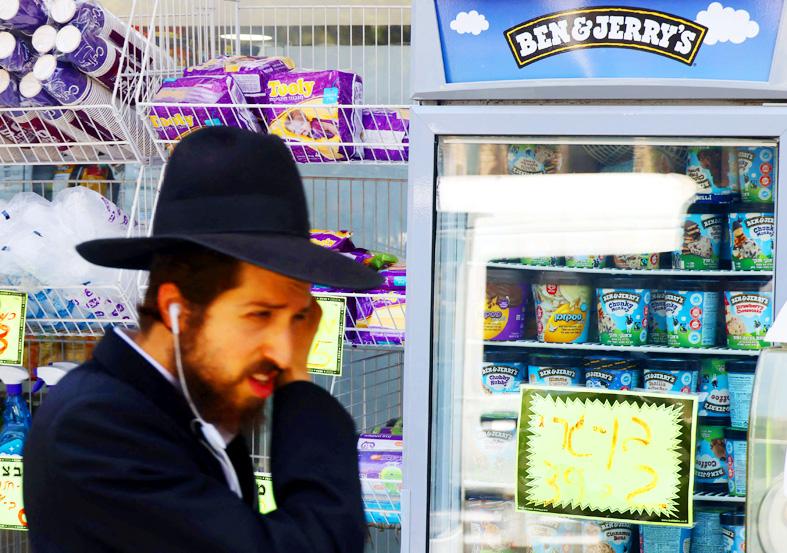Unilever PLC yesterday said that surging commodity costs would squeeze its full-year operating margin, overshadowing strong second-quarter sales growth fueled by the easing of COVID-19 pandemic-related curbs in many of its markets.
Underlying sales for the maker of Dove soap maker rose 5 percent in the three months ended June 30, beating analysts’ average forecast of 4.8 percent. However, rising prices of everything from crude to palm and soybean oil made the company cut its operating margin outlook to “about flat” from slightly up, and flag greater uncertainty surrounding that forecast.
The warning dragged shares of the FTSE 100-listed company down 4.4 percent by 8:30am, wiping off nearly £5 billion (US$6.87 billion) of its market value, and making it the top loser on the index in morning trading.

Photo: AFP
“This is slightly disappointing, as they had been confident of passing through cost inflation at the first quarter stage,” Investec analyst Alicia Forry said. “Now they change their tune... This margin issue will overshadow the strong underlying performance in H1.”
First-half sales rose 5.4 percent, a touch above the 5.3 percent forecast, propelled by 8.1 percent growth in its foods and refreshment division, as living restrictions began to ease in many markets.
In Europe, sales of ice cream eaten out of home grew by a double-digit percentage, with consumption also strong in markets like China and India.
Sales of teas, including Lipton and PG Tips, also drove strong volume growth.
“We believe full-year outlook will land well within the 3-5 percent growth range,” chief financial officer Graeme Pitkethly said on a media call.
However, he played down expectations for margin growth, blaming higher logistics and first-half increases in palm oil prices that squeezed margins in its beauty and personal care unit, and petrochemicals used in manufacturing its home care brands ,including Lifebuoy soaps and Omo detergents.
CEO Alan Jope said the uncertainty around commodity costs and when it might see the benefits of increased prices for its products created “a higher than normal range of likely year-end margin outcomes.”
Unilever did not comment about a controversy over its US subsidiary Ben & Jerry’s move to end ice cream sales in occupied Palestinian territories that has caused a backlash against the brand in Israel.
The £112 billion company is not the first to flag margin pressures.
Unilever added that it had completed the review of its tea business, and anticipates either an initial public offering, sale or partnership before the end of October.
Underlying earnings per share came in at 1.33 euros, while turnover was 25.8 billion euros (US$30.4 billion) for the first half, both ahead of estimates.

Taiwan’s long-term economic competitiveness will hinge not only on national champions like Taiwan Semiconductor Manufacturing Co. (TSMC, 台積電) but also on the widespread adoption of artificial intelligence (AI) and other emerging technologies, a US-based scholar has said. At a lecture in Taipei on Tuesday, Jeffrey Ding, assistant professor of political science at the George Washington University and author of "Technology and the Rise of Great Powers," argued that historical experience shows that general-purpose technologies (GPTs) — such as electricity, computers and now AI — shape long-term economic advantages through their diffusion across the broader economy. "What really matters is not who pioneers

In a high-security Shenzhen laboratory, Chinese scientists have built what Washington has spent years trying to prevent: a prototype of a machine capable of producing the cutting-edge semiconductor chips that power artificial intelligence (AI), smartphones and weapons central to Western military dominance, Reuters has learned. Completed early this year and undergoing testing, the prototype fills nearly an entire factory floor. It was built by a team of former engineers from Dutch semiconductor giant ASML who reverse-engineered the company’s extreme ultraviolet lithography (EUV) machines, according to two people with knowledge of the project. EUV machines sit at the heart of a technological Cold

TAIWAN VALUE CHAIN: Foxtron is to fully own Luxgen following the transaction and it plans to launch a new electric model, the Foxtron Bria, in Taiwan next year Yulon Motor Co (裕隆汽車) yesterday said that its board of directors approved the disposal of its electric vehicle (EV) unit, Luxgen Motor Co (納智捷汽車), to Foxtron Vehicle Technologies Co (鴻華先進) for NT$787.6 million (US$24.98 million). Foxtron, a half-half joint venture between Yulon affiliate Hua-Chuang Automobile Information Technical Center Co (華創車電) and Hon Hai Precision Industry Co (鴻海精密), expects to wrap up the deal in the first quarter of next year. Foxtron would fully own Luxgen following the transaction, including five car distributing companies, outlets and all employees. The deal is subject to the approval of the Fair Trade Commission, Foxtron said. “Foxtron will be

INFLATION CONSIDERATION: The BOJ governor said that it would ‘keep making appropriate decisions’ and would adjust depending on the economy and prices The Bank of Japan (BOJ) yesterday raised its benchmark interest rate to the highest in 30 years and said more increases are in the pipeline if conditions allow, in a sign of growing conviction that it can attain the stable inflation target it has pursued for more than a decade. Bank of Japan Governor Kazuo Ueda’s policy board increased the rate by 0.2 percentage points to 0.75 percent, in a unanimous decision, the bank said in a statement. The central bank cited the rising likelihood of its economic outlook being realized. The rate change was expected by all 50 economists surveyed by Bloomberg. The